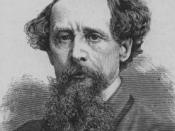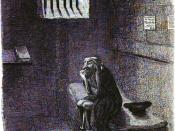The treatment of the poor in Victorian times were terrible. The poor were incredibly poor, with no housing or enough money to support their families, unlike today, where poor means buying economy products instead of brand names. In Victorian England the pace of industrialisation was such that there was a large gap between the poor and the rich and the poor had hardly any rights at all. In Dickens novel, Oliver Twist, he shows how bad the life of the poor was, children in particular.
In Oliver Twist, Oliver was born in a workhouse, this happened right at the start of the book, and Dickens shows right away how since Oliver started out life in a workhouse he was set in life as a poor person: "It would have been hard for the haughtiest stranger to have assigned to him his proper station in society..."
Dickens shows how badly the poor were treated all their lives by the narrator telling us of Mrs Mann, a woman who was in charge of lots of orphan children.
Her treatment of them was uncaring- the children in her care were: "inadvertently scalded to death when there happened to be a washing," or accidentally starved to death from neglect. Because Oliver was placed in society as being poor, he was treated very badly with no affection or love, just hostility and neglect.
When Oliver became 9, he was too old to stay with Mrs Mann under her care and was moved to work in a workhouse with hundreds of other poor people, lunatics, criminals, and prostitutes. Because of the Poor Law Amendment Act of 1834, conditions in workhouses were terrible. The original Poof Law was that "outdoor relief"- food given out to poor people to survive- was given to all unemployed...


